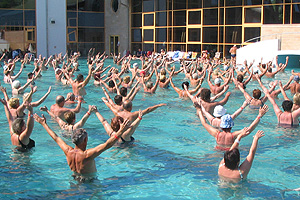If You Can’t Get Moving, Get a Friend to Move You

People who exercise in a group have greater workout completion rates and are better able to maintain weight loss.
For many people, exercise is the dreaded monster. Starting any exercise plan seems impossible and odds stack against them before they begin.
According to the Centers for Disease Control and Prevention, despite the numerous physical and psychological benefits of exercise, two-thirds of American adults do not engage in regular exercise and one-quarter are sedentary.
Annette Boles, director of the Garrison Institute on Aging, said if you can’t get moving by yourself, find a friend or create a fitness team to help you.
Find Encouragement
“If an individual is surrounded by people that have similar exercise goals, he/she may stay motivated,” Boles said. “Therefore, the individual may have more long-term success. Starting with a team is a great kick-start for anyone that hasn't exercised in awhile.”
In a study by the International Journal of Stress Management, research showed that individuals were not only calmer, but also felt more benefits from their workout in a group more than if they worked out alone. Another study published in the Journal of Consulting and Clinical Psychology found that participants recruited alone for weight loss programs had a 76 percent completion rate and 24 percent maintained their weight loss, whereas those recruited with friends boasted a 95 percent completion rate and 66 percent maintained their weight loss in full for six months.
Boles said exercising on a team gives individuals accountability. For instance, if a group decides to work out at a certain time of day, you may be more apt to attend because your team is depending on you.
“Exercising in a group provides a social environment, and typically, the group is encouraging,” Boles said. “A person within the group may have similar questions and concerns about exercise that can make an individual feel at ease. A team can also make reaching a specific goal more fun.”
Exercising in a team also can provide challenges. If you hit a plateau, a team may challenge you to add more to your fitness plan, reevaluate your eating habits or change up your workout.
Adopt the Lifestyle
Boles gave these tips to get started:
- Always start at your current fitness level and slowly increase the minutes of exercise.
- Set realistic goals.
- Surround yourself with others that are exercising.
- Try a new exercise or activity.
- Make exercise a part of your day, add it to your calendar and make it a fun priority.
- Before you begin any exercise program, always check with your doctor for any issues of which you should be aware.
“Don’t get discouraged,” Boles said. “Find those people around you who will challenge you physically and mentally to keep your new fitness regime going. Together, you can find a successful exercise and fitness plan that hopefully will keep you moving from this point on.”
Each year, the Garrison Institute on Aging offers GET FiT Lubbock, a program that encourages group and individual fitness.
Related Stories
Celebrating Veterans: TTUHSC’s General Martin Clay’s Legacy of Service and Leadership
From his initial enlistment in the Army National Guard 36 years ago to his leadership in military and civilian health care management roles, Major General Martin Clay’s career has been shaped by adaptability, mission focus and service to others.
Texas Tech University Health Sciences Center School of Nursing Named Best Accelerated Bachelor of Science in Nursing Program in Texas
The TTUHSC School of Nursing Accelerated Bachelor of Science in Nursing (BSN) program has been ranked the No. 1 accelerated nursing program in Texas by RegisteredNursing.org.
TTUHSC Names New Regional Dean for the School of Nursing
Louise Rice, DNP, RN, has been named regional dean of the TTUHSC School of Nursing on the Amarillo campus.
Recent Stories
National Academy of Inventors Names TTUHSC Faculty Senior Members
The National Academy of Inventors (NAI) has designated two current and one former TTUHSC faculty researchers as Senior Members.
The John Wayne Cancer Foundation Surgical Oncology Fellowship Program at Texas Tech University Health Sciences Center Announced
TTUHSC is collaborating with the John Wayne Cancer Foundation and has established the Big Cure Endowment, which supports the university’s efforts to reduce cancer incidence and increase survivability of people in rural and underserved areas.
TTUHSC Receives $1 Million Gift from Amarillo National Bank to Expand and Enhance Pediatric Care in the Panhandle
TTUHSC School of Medicine leaders accepted a $1 million philanthropic gift from Amarillo National Bank on Tuesday (Feb. 10), marking a transformational investment in pediatric care for the Texas Panhandle.
